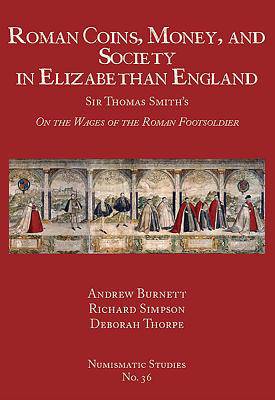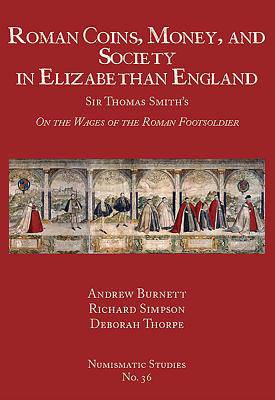
- Retrait gratuit dans votre magasin Club
- 7.000.000 titres dans notre catalogue
- Payer en toute sécurité
- Toujours un magasin près de chez vous
- Retrait gratuit dans votre magasin Club
- 7.000.0000 titres dans notre catalogue
- Payer en toute sécurité
- Toujours un magasin près de chez vous
Roman Coins, Money, and Society in Elizabethan England
Sir Thomas Smith's on the Wages of the Roman Footsoldier
Andrew Burnett, Richard Simpson
105,95 €
+ 211 points
Description
Sir Thomas Smith's On the Wages of a Roman Footsoldier (OWRF) is virtually unknown to modern scholarship and, although it is the first original work written in England to use the evidence of ancient coins, it has previously played no part in the history of numismatics. Yet it clearly deserves to be better known. It throws new light on the 'Cambridge circle, ' the group of academics-turned-politicians who played a crucial role in the smooth accession of Elizabeth I. It allows us to reconstruct something of the humanistic interest in numismatics. It provides another strand to our knowledge of the importance of the Roman precedent in both influencing contemporary thought and having a direct bearing on contemporary politics.
Sir Thomas Smith was one of the most important politicians and intellectuals of the day; a brilliant academic career at Cambridge was followed by his active participation in politics under Edward VI, Mary, and Elizabeth. He played a leading role in the controversial reform of Greek pronunciation; he introduced a new style of continental architecture to England; and he wrote analyses of the politics of his day, including his views on the relations between the monarch and parliament, views which were to be seized on in the crisis of the 17th century in a way which would no doubt have startled Smith had he lived to see it.
For this reason the publication of the ORWF is accompanied by Richard Simpson's personal and intellectual biography of this most important of the 'missing persons' of the 16th century. The biography is intended partly to remedy some of the misconceptions about Smith but, more importantly, to set OWRF and his other writings in a coherent biographical framework.
Deborah Thorpe provides the complete transcription of the original manuscript's text, with notes.
Sir Thomas Smith was one of the most important politicians and intellectuals of the day; a brilliant academic career at Cambridge was followed by his active participation in politics under Edward VI, Mary, and Elizabeth. He played a leading role in the controversial reform of Greek pronunciation; he introduced a new style of continental architecture to England; and he wrote analyses of the politics of his day, including his views on the relations between the monarch and parliament, views which were to be seized on in the crisis of the 17th century in a way which would no doubt have startled Smith had he lived to see it.
For this reason the publication of the ORWF is accompanied by Richard Simpson's personal and intellectual biography of this most important of the 'missing persons' of the 16th century. The biography is intended partly to remedy some of the misconceptions about Smith but, more importantly, to set OWRF and his other writings in a coherent biographical framework.
Deborah Thorpe provides the complete transcription of the original manuscript's text, with notes.
Spécifications
Parties prenantes
- Auteur(s) :
- Editeur:
Contenu
- Nombre de pages :
- 222
- Langue:
- Anglais
- Collection :
- Tome:
- n° 36
Caractéristiques
- EAN:
- 9780897223522
- Date de parution :
- 09-11-17
- Format:
- Livre relié
- Format numérique:
- Genaaid
- Dimensions :
- 211 mm x 297 mm
- Poids :
- 997 g

Les avis
Nous publions uniquement les avis qui respectent les conditions requises. Consultez nos conditions pour les avis.






